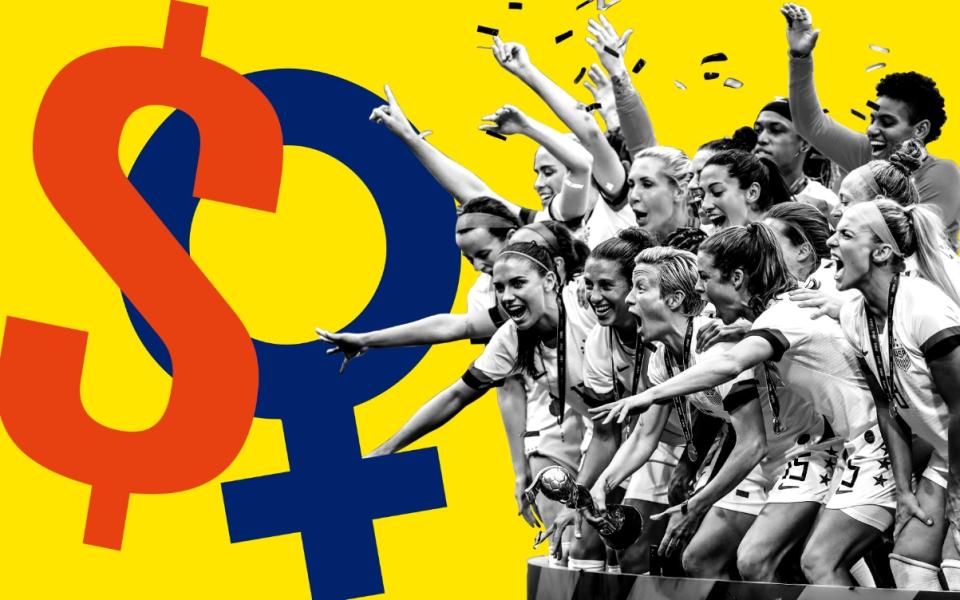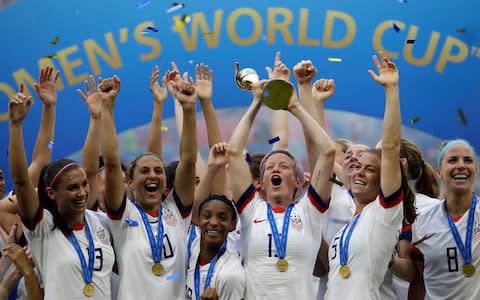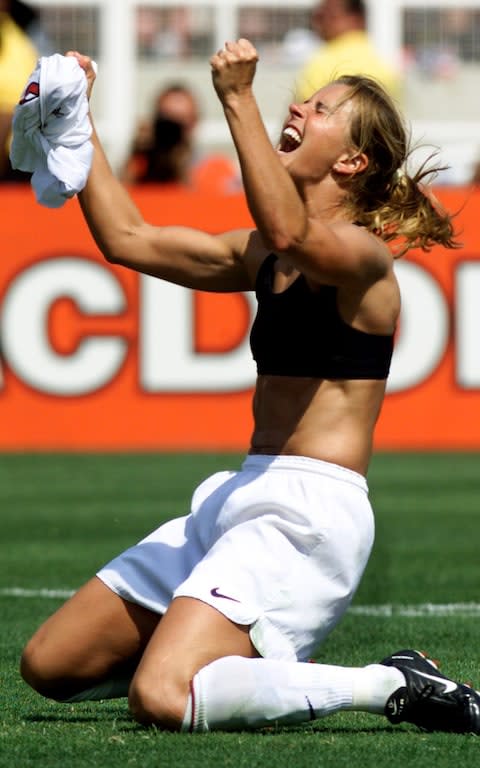How US Women's historic 2019 World Cup win continues to influence fight for equality six months on


With Tuesday marking six months since the Women's World Cup final, Telegraph Women's Sport looks at the wider impact the USWNT world champions have had, interviewing those both inspired and involved in their fight for equal pay.
"From little things big things can grow," Kerry Harris says. Stood in the merchandise queue on July 7, ahead of kick-off at the World Cup final at the Parc Olympique Lyonnais, the former board director of Women's Soccer Australia had an idea.
"I could see a USA fan group in front of me, decked out in all the gear - on the back of their t-shirts was #EqualPay," Harris says. "Like a lightbulb moment I thought, 'Get them to chant equal pay'. And it just snowballed."
Her "little" suggestion reverberated around the 59,000-seater stadium at full-time as the USA won their second consecutive World Cup title. A thunderous, unified chant for equal pay enveloped the squad as they lifted the trophy. And even when the confetti had fluttered to the grass and the crowd dissipated in Lyon, the calls for this indomitable team to be enumerated fairly by their own federation did not die down.
The hashtag trended on Twitter and on the streets of New York City the support grew louder as the team were welcomed home at their ticker-tape open-top bus parade. Spurred on, the women were seen flinging reams of paper in the air from their gender discrimination lawsuit against the United States Soccer Federation (USSF). Megan Rapinoe gave a stirring speech encouraging unity on a day that summed up just how they have lived up to their role as standard-bearers and agitators in the women's game in 2019.

On International Women's Day in March last year the USWNT brought a lawsuit against the USSF, demanding equal pay for equal work and conditions and investment that matched the men's national team. Though their quest for equality came to a head in 2019, this was at least two decades in the making.
"This is not a new conversation, an idea that this team came up with," former USWNT player and two-time World Cup winner Brandi Chastain tells the Daily Telegraph. "We have been negotiating with US soccer for over 20 years."
The USWNT have advocacy in their DNA, dating back to when they threatened to boycott the 1996 Olympics over bonuses promised to the men's team. Then the 1999 World Cup, held in the USA, is described by many as a watershed moment for increasing the visibility of the sport. Chastain's celebration, in her sports bra, sliding on her knees in jubilation, when she secured the title with a penalty in front of 90,185 remains a defining image from it. There is a touch of symmetry in that and Rapinoe's contribution to women's football iconography this past summer.
Open-armed and betraying a hint of a smile after scoring against France in the quarterfinals, the eventual Golden Ball winner aptly represented a group of women unabashed about taking up space in the world - no matter the pushback. Be it that they celebrated too much in their 13-0 win over Thailand; Rapinoe was a distraction in her public feud with President Donald Trump; Alex Morgan was arrogant in her teacup celebration against England. Lambasted with this kind of criticism, they practically breezed through the tournament despite the pressure on their backs as the outright favourites.

Upon returning home victorious, their own federation did not play ball. In an open letter published just 22 days after their World Cup triumph, USSF President Carlos Cordeiro outlined the women's pay structure as compared to the men's. In a poorly veiled attempt to get the public onside, he hid behind numbers to make it appear that the women earn more for equal work - when in reality the men, who failed to qualify for the 2018 World Cup, are given more substantial match bonuses but just do not play (or win) as much. A month later mediation talks between the squad and federation broke down, forcing their legal battle to a court date now set for May - mere months before the Tokyo Olympics.
"There's tremendous disappointment," the USWNT's lawyer Jeffrey Kessler tells the Daily Telegraph. "I don't know if I'd call it surprise because this is just a pattern of the USSF: they talk a good game but when it comes to actually delivering they repeatedly fall short."
Nevertheless he is confident in the team's ability to juggle their court date alongside Olympic preparation. Not only is it their fight, it's a fight that in November was granted class status by the judge, meaning any compensation won would apply to women who have appeared in a national team camp or game dating back at least four years, according to Kessler. He believes the team's influence stems further than simply different generations of squads though, likening them to tennis women's rights pioneer Billie Jean King.
Thank you @time for recognizing this TEAM, and all that we stand for, on and off the field. ��
A post shared by Megan Rapinoe (@mrapinoe) on Dec 11, 2019 at 12:00pm PST
Since the team began their legal battle, others have been inspired to boycott over pay disputes; Zimbabwe, Jamaica and the entire Spanish top division among them. The USWNT are also using their mainstream platform, which has seen them grace fashion magazine covers and named Time's 'Athlete of the Year', to make a concrete difference too, including partnering with Time's Up to raise money for women fighting for equal pay in all workplaces.
And politicians are taking notice (aside from Trump). Senator Elizabeth Warren, a leading candidate for the Democrat presidential nomination, recruited Rapinoe's official endorsement for her campaign earlier this month, in a nod to the level of influence the player now has. And in July two senators, Dianne Feinsten and Patty Murray, introduced a bill calling for US sporting national governing bodies to compensate their male and female athletes equally.

"We wanted to honour their victory with more than just a parade," Feinstein tells the Daily Telegraph. "Title IX [1972 landmark US legislation which prohibits discrimination on the basis of sex in any government-funded educational program, including college sports] was about more than ensuring girls had opportunities to play sports. It was about treating men and women athletes equally, and our bill would push that idea forward for US national teams."
That major sponsors, like P&G who took out a full page ad in the New York Times calling for the USSF to pay the team equally, are taking a stand is also huge. "I’ve been studying this for over 20 years, and the arguments that people like me were making were 'it's the right thing to do' to pay women equally," Professor Nancy Lough, a marketing and gender equity in sport researcher at the University of Las Vegas, explains. "But we can now make the economic argument for women’s sport. We’re starting to see sponsors push for change - they know there is a return on investment in doing so."
The Australian football federation awarded their women's team equal pay in October in acknowledgment of these developments, following Norway, who made similar changes two years ago. "I wish US Soccer had done that first," Chastain says. "I’m exhausted and frustrated that we’re still having this conversation."
The most successful team in history and the loudest advocators for equality are done waiting.

 Yahoo Sport
Yahoo Sport 





































